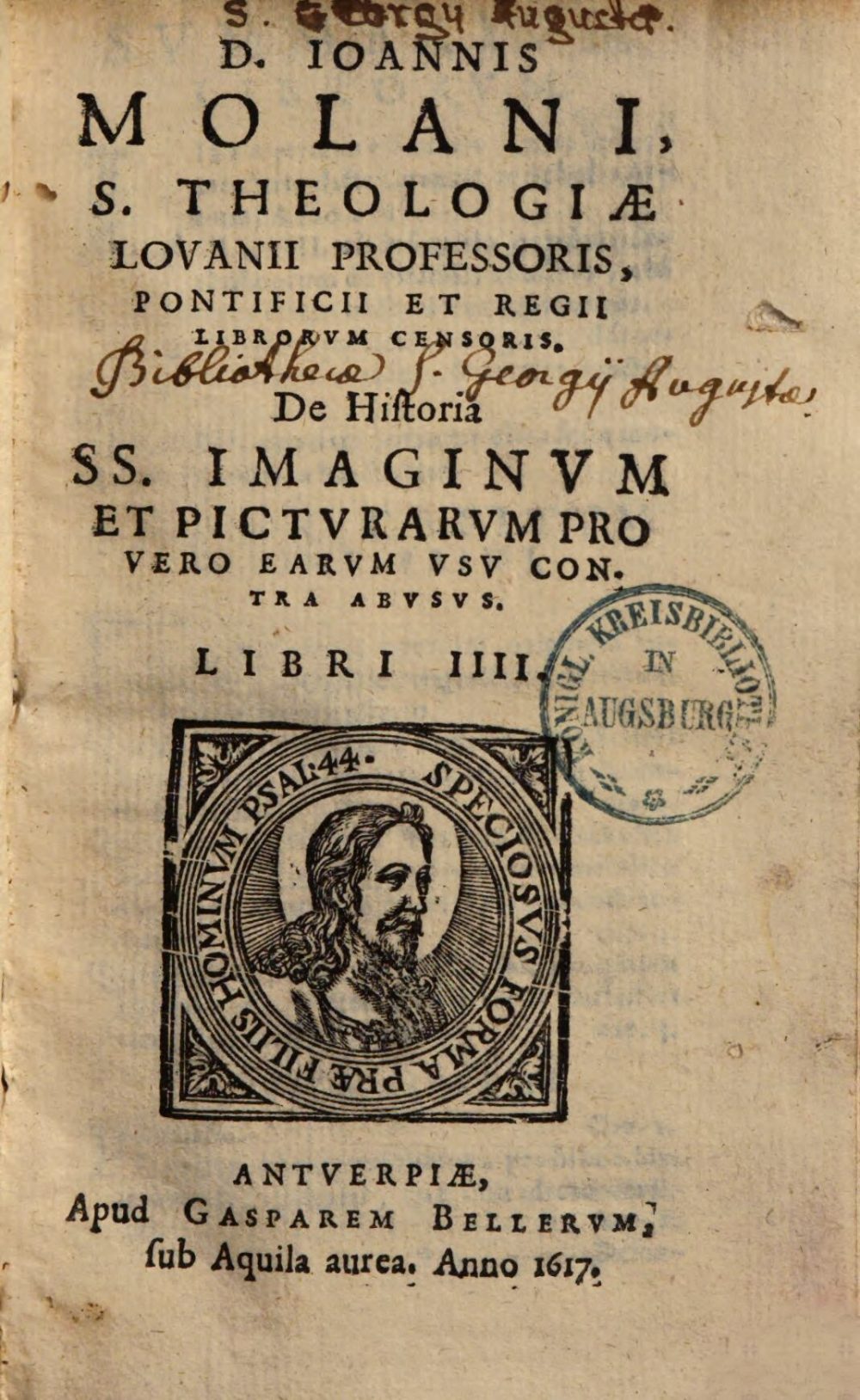
Augsburg, Staats- und Stadtbibliothek — Th H 1475. Digital Reproduction: München, Bayerische Staatsbibliothek, 2015.
Molanus counters the claims of the Anabaptists that certain virtues have been turned into fictive saints in the Catholic Church
“There is a very graceful and intolerable slander by some people who claim that in the Catholic Church the allegories of certain virtues have been transformed into fictive saints. The first to bring up this accussation were, in my opinion, certain Jewish scholars, who wanted that this singular model of patience, Job, never existed, but that his virtue was only romanticised by forging an allegory. This absurdity has been adopted by certain Anabaptist fanatics who claim that the argument in the book of Job is of the comic kind and was invented according to the laws of the stage, against them, in Book VIII of his Bibliotheca Sancta, Sixtus of Siena gives many arguments. It seemed to me a pleasure to take up some of them here: That the story of the book of Job is an invention, and that Job himself never existed and never belonged to the human race, is a heresy of the Anabaptists of our time, who mock this book by calling it a Hebrew tragi-comedy, that is to say, a fable produced half according to the laws of comedy and half according to those of tragedy, for the beginning of the story in which the murder of Job’s sons and daughters is reported is usually found in tragedy, and the end which sets up a happy end for Job is the proper one of comedy. This unholy error was taken by the hardened Anabaptists from the Baba Batra of the circumcised Jews, that is, from the third part of the fourth order of the Talmud. Now the Holy Scriptures are quite contrary to this, for they attest that Job existed; moreover, they count him among the men eminent for their holiness. For in Ezekiel God says: If Noah, Daniel, and Job be found in this land, they shall make their souls free by their righteousness. And James, in the Catholic epistle which bears his name, proposing Job’s admirable patience in adversity for imitation, says: ‘You have heard of Job’s steadfastness, and have seen the Lord’s purpose.'”
“Gravissima est autem et intoleranda quorumdam calumnia, quod in Catholica Ecclesia schemata nonnulla virtutum conserva afferant in fictitios sanctos. In qua accusatione primos puto fuisse Iudaeos quosdam Rabbinos, qui singulare illud exemplar patientiae, Iob, nunquam exstitisse volunt, sed narrari tantum fictiotium aliquod eius virtutis schema. Quorum absurditatem fanatici quidam Anabaptistae sunt secuti, qui argumentum libri Iob comicum afferunt et iuxta scenae leges confictum, Contra quos multa habet Sixtus Senensis lib. VIII Bibliotheca sanctae. Ex quo pauca visum fuit huc adferre. Historiam libri Iob, ait confictam esse ipsumque Iob nunquam in humanis fuisse haeresis est Anabaptistarum nostri temporis, qui librum hunc ridentes, appellent eum, tragicocomediam Hebreorum, hoc est fabulam partim secundum comoediae, partim secundum tragoediae leges editam: quia principio ipsius historiae caedes filiorum ac filiarum Iob, quod in tragoediis usu venit, referantur, in fine vero; quod comoediae proprium est, felices Iob eventus ponantur. Atque hunc impium errorem retincti Anabaptistae accepterunt a recutitis Iudaeis ex Baba Batra, hoc est, tertia parte quarti ordinis librorum Thalmudicorum. Sed Divinae scripturae omnino contradicunt, quae non solum Iob fuisse testantur, verum inter viros sanctitate praecipuos enumerant. Nam in Ezechiele inquit Deus, ‘Si steterint in medio, Nohe, Daniel et Iob, ipsi in iustitia liberabunt animas suas’: et Iacobus in sua Catholica, admirabilem Iob patientiam in adversis imitandam proponems, ‘Sufferentiam inquit Iob audistis, et finem Domini vidistis.'”
Molanus 1996, 305-306.



